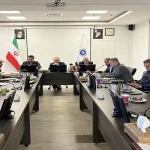Managers of mobile operators say that they do not have enough money to invest in 5G, and the solution to this problem is to increase mobile internet tariffs. According to the Deputy Planning Minister of the Ministry of Communications, the Minister of Communications also agrees with them.
According to the IDEA, the directors of the Ministry of Communications and three mobile operators of the country discussed the challenges facing the fifth generation of communications in Iran in a panel at the IRAN 5G conference.
Ali Asghar Ansari, Deputy Director of Planning and Strategic Supervision of the Ministry of Communications and Information Technology said in this meeting: A few years ago, the Research Institute of Communications and Information Technology wrote the 5G roadmap, but it was not used because the Ministry of Communications did not believe in the roadmap and as a commissioned work this He did the work. Generally, the operators had a business plan due to the license, but the governance and regulation could not refer it to the operators. This gap existed in the past years.
He announced the compilation of two “capacity” and “quality indicators” documents regarding 5G.
Ansari also said: The operators’ concern about the tariff is correct. Mr. Dr. Zarepour believes that 5G cannot be developed with the current tariffs. With the current tariff and contents of 5G, it is not justified unless we stimulate the demand. In order to solve the problems of this part, the 5G development working group should be formed as a matter of urgency.
According to him, a new regulatory chapter should be opened in this sector, and to measure 5G, in addition to speed and coverage, we should also measure the influence of 5G in industries.
Ansari also announced the work on the opening of a system through which it is possible to monitor the statistics of imports and domestic production of electronic devices.
Telecom will suffer the fate of the electricity industry
Vahid Shahmansouri, the director of the first mobile research and development center, also said in this panel: Support in the telecommunications industry should be long-term and consistent. If we want to launch 5G, we must have a four-five-year plan to determine the business model of this field. If the same process continues, our telecommunications industry will be like the electricity industry today in five years, when the electricity company has to ask people to consume less electricity for the summer.
He continued: The complexity of this technology has made it very expensive and costs three to four times that of 4G. The reason for this complexity is to respond to needs that 4G could not respond to.
According to him, if we are looking for connected cars, we need at least 2,000 mobile 5G sites only in Tehran. Shah Mansouri suggested that we respond to our needs in the form of 4G until the operators can invest in the fifth generation.
100 MHz frequency, 3 thousand billion Tomans
Irancell’s Technical Vice President Hassan Bolvardi, as a representative of this operator, did not find the conditions for 5G development suitable and said: Network development requires technical infrastructure, frequency and consumer demand. We are stuck in almost all three dimensions and they are not moving forward as they should.
He criticized the fixed internet tariff and said: It is time for this to happen after several years of promises made by the regulator. The difference between fixed and mobile internet should increase significantly. The absence of this difference is another obstacle for us.
Bolverdi also explained about the 5G frequency problems: For the fifth generation of communication, we want a frequency of 100 MHz. The regulator has been involved in assigning this frequency for three or four years. For 100 MHz frequency, 3 thousand billion Tomans is expensive at the very beginning because we tax 30% of royalties and 20% of income.
The Technical Vice President of Irancell called the locking of the 5G capability by the manufacturer as another problem and suggested that the Regulatory Organization and the Ministry of Security impose restrictions on the import of these phones to be a lever to pressure the manufacturers to activate 5G.
Rightel: Give away the frequency band fairly
Ahmadreza Aghaei, Director General of Network Design and Optimization of Rightel’s technical and engineering deputy, also requested in this panel that the frequency band be given to operators equally and said: If Rightel is lagging behind in some areas, it is because of support that has not been provided, such as restrictions on video calls. Less than 100 MHz frequency bandwidth for 5G has no explanation. We have to divide this frequency band between three operators.
Azim Fard, Director General of the Spectrum Monitoring Office of the Radio Communications Regulatory Organization, said in response: “When we hand over the frequency, the operator must build a network on it, and if it remains empty, others will use it.” 100 MHz cannot be assigned to three operators and 100 MHz must be assigned to two of them by competition between these three.
Rightel’s technical vice-president further said: Rightel has a good relationship with industries and has started negotiations for the development of 5G-based technologies in the fields of oil, gas and steel, but it is difficult to justify it for industries. Coordination between mobile and vendor technology should be coordinated. Otherwise, the creation of a 5G network will not be successful, at least in the field of industry.




No Comment! Be the first one.